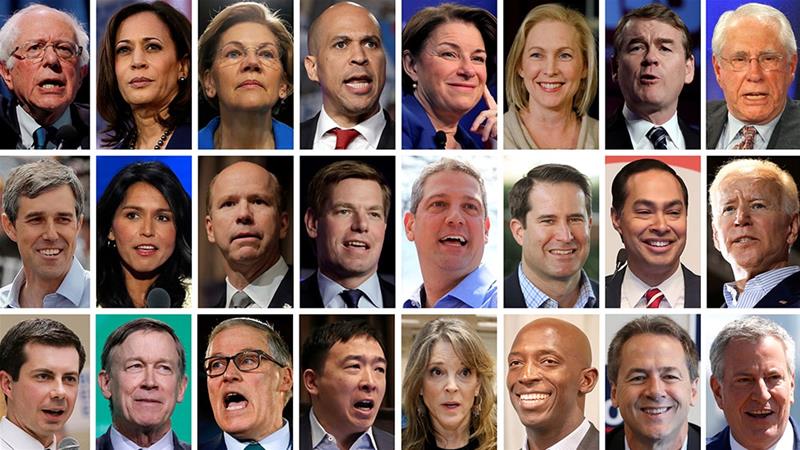How do you handicap a presidential race with more than 20 candidates? Just like any other decision, you need solid data. We searched for some solid comparisons in the swelter of social media, canned stump speeches and double dueling debates.

Can you count on your politicians? More importantly can you bet on them.
Online Sportsbooks offer opportunities to wager on who will face off with Donald Trump in 2020. While it may be entertaining to lay a bet on your favorite candidate, the crowded field represents some real profitable opportunities. If you have enough data.
Below are the current odds from Bovada.
| 2020 Democratic Nomination Odds | |
|---|---|
| Joe Biden (D) +200 | Kamala Harris (D) +275 |
| Bernie Sanders (D) +550 | Elizabeth Warren (D) +450 |
| Tulsi Gabbard (D) +2500 | Cory Booker (D) +4000 |
| John Delaney (D) +10000 | Kirsten Gillibrand (D) +8000 |
| Andrew Yang (D) +1300 | Amy Klobuchar (D) +4000 |
| Beto O’Rourke (D) +1800 | Julian Castro (D) +10000 |
| Pete Buttigieg (D) +500 | Hillary Clinton (D) +5000 |
| John Hickenlooper (D) +10000 | Jay Inslee (D) +10000 |
| Seth Moulton (D) TBA | Tim Ryan (D) +10000 |
| Michael Bennet (D) +10000 | Eric Swalwell (D) +10000 |
| Steve Bullock (D) TBA | Bill de Blasio (D) +10000 |
| Wayne Messam (D) TBA | Marianne Williamson (D) +10000 |
It is interesting to note that several other gaming sites have narrowed the odds between front-runner Biden and Senator Kamala Harris. One book has even given Harris a +200 to +225 edge. But note that after the top four, the odds rocket to extremes that beg for a long-shot wager.
But if you inclined to make a political wager, where do you find reliable information in our social media saturated world? Below we run down three solid information sources for bettors to handicap the political field.
For the crowded democratic party field of candidates we turn to the New York Times, CNN and one lesser known source.
The New York Times Dynamic Page
Count on the New York Times to go over and above with presidential statistics. Their often updated page asks the question: Which Democrats Are Leading the 2020 Presidential Race? And they deliver multiple answers from multiple angles. Here’s just a taste of the data available:
- Current State of the Race. Includes national polling average, money raised and weekly news coverage
- Who’s Leading in the Polls. A dynamic chart showing top five candidate numbers since January 2019.
- Latest Polls in Early Primary States (Nevada, Iowa, New Hampshire)
- Who is Leading the Money Race
- Who is Getting News Coverage (mentions per week)
The data rich Times site updates several of these sections each week.
CNN Presidential Candidates Fast Facts
CNN adds three more pieces to the presidential race data stream. First, there is a link to the candidates homepage, where all types of self-serving information can be found. CNN also adds a link to a video which is either the candidates formal announcement for president or a interview about their potential candidacy. But the best set of data coming from CNN is a link to each candidates “Fast Facts.” Here you can discover where the candidate was educated, what offices he or she has held in a comprehensive timeline. Also included are “other facts” some fanciful, some informative:
- Kamala Harris’ names comes from the Sanskrit word meaning “lotus” flower.
- Cory Booker received a football scholarship to attend Stanford University.
- Before the mid-1990s, Elizabeth Warren was a registered Republican.
- Bernie Sanders applied for conscientious objector status during the Vietnam War.
Quartz (qz.com)
Quartz gives us a thorough thumbnail on all 25 candidates. Information here includes a brief life sketch, and an excellent investigative piece on ‘who gives them money.’ Also included are the candidates social media numbers, how many followers can be a big deal in a close election, just ask Barack Obama. Lastly, we are told ‘who will like this candidate’ and ‘who will hate this candidate.’
Here are a few interesting snippets in the seven categories offered on Quartz.
Bio: The best-selling author of 12 books on spiritually, including Healing the Soul of America. (Marianne Williamson)
Age:44Â Â Years in politics: Less than one (Andrew Yang)
Who gives him money: Funded by banks, housing and construction companies in his congressional race. Independently wealthy, funding himself now. (John Delaney)
Biggest idea for the economy: A “baby bond” program that would give every child a US Treasury bond at birth, with a larger amount for poorer kids. (Cory Booker)
Social media following:Â Twitter: 8.1 million, Facebook: 7.5 Million, Instagram: 2.9 Million. (Elizabeth Warren)
Who will like this candidate:Â Centrists who think a steady hand means an older billionaire; gun-control supporters. (Michael Bloomberg)
Who will hate this candidate:Â Given a list of New York politicians who they’d choose for president, even New Yorkers didn’t go for him. (Bill de Blasio)
The Quartz site has a lot of information and a quite a bit of insider humor. But the data is both solid and presented with a nod to the presidential politics of 20+ runners.
Yes, there is such thing as data overkill, but research is nearly always a wise endeavor before you step up to the window. These three sources should tell you a lot more about who really stands a chance to connect with the American people and ultimately serve as the Democratic nominee.
Tim Lavalli holds a Ph.D. in psychology and has focused his work on the mental aspects of competitive games. He also holds a degree in Political Science. You can follow him on Twitter @timlavalli.











